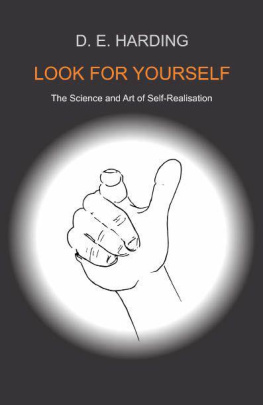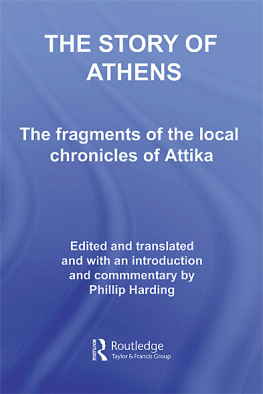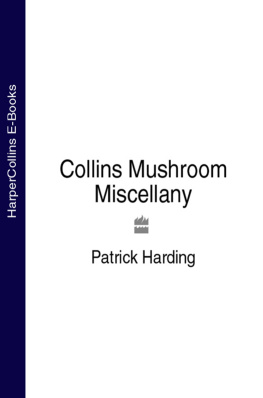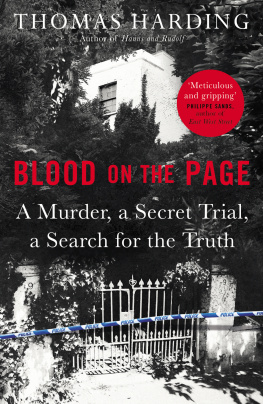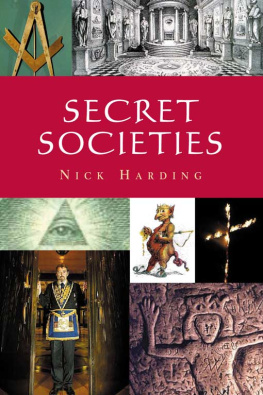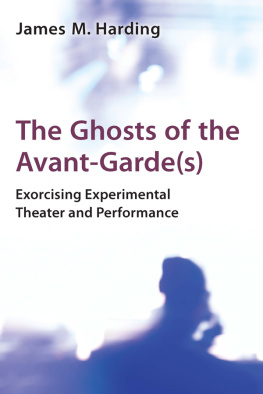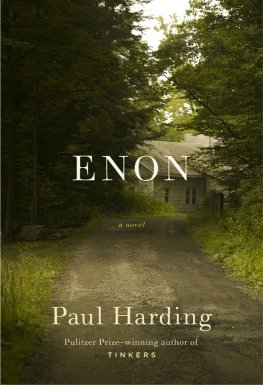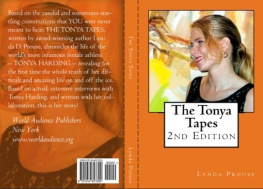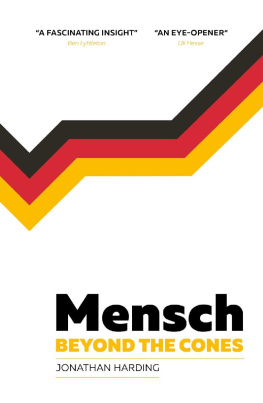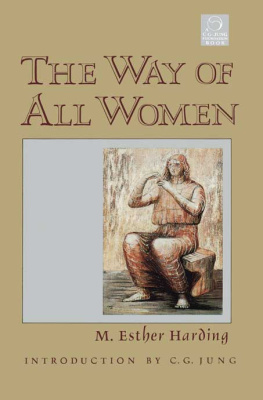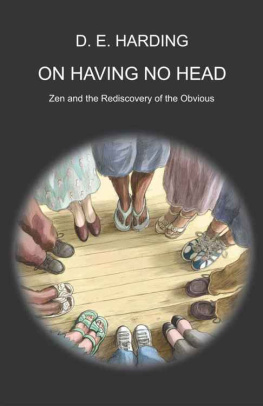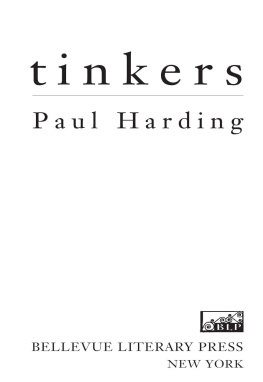Harding - Look For Yourself
Here you can read online Harding - Look For Yourself full text of the book (entire story) in english for free. Download pdf and epub, get meaning, cover and reviews about this ebook. year: 2012, publisher: The Shollond Trust, genre: Religion. Description of the work, (preface) as well as reviews are available. Best literature library LitArk.com created for fans of good reading and offers a wide selection of genres:
Romance novel
Science fiction
Adventure
Detective
Science
History
Home and family
Prose
Art
Politics
Computer
Non-fiction
Religion
Business
Children
Humor
Choose a favorite category and find really read worthwhile books. Enjoy immersion in the world of imagination, feel the emotions of the characters or learn something new for yourself, make an fascinating discovery.
Look For Yourself: summary, description and annotation
We offer to read an annotation, description, summary or preface (depends on what the author of the book "Look For Yourself" wrote himself). If you haven't found the necessary information about the book — write in the comments, we will try to find it.
Look For Yourself — read online for free the complete book (whole text) full work
Below is the text of the book, divided by pages. System saving the place of the last page read, allows you to conveniently read the book "Look For Yourself" online for free, without having to search again every time where you left off. Put a bookmark, and you can go to the page where you finished reading at any time.
Font size:
Interval:
Bookmark:

Published by The Shollond Trust
87B Cazenove Road
London N16 6BB
England
headexchange@gn.apc.org
www.headless.org
The Shollond Trust is a UK charity reg. no 1059551
First published by Head Exchange Press 1996
Copyright The Shollond Trust 2012
All rights reserved. No part of this eBook may be reproduced or utilized in any form or by any means, electronic or mechanical, without prior permission in writing from the publishers.
ISBN 978-0-9568877-2-6
LOOK FOR YOURSELF
The Science and Art of Self-Realisation
D. E. Harding

The Shollond Trust
It might be good to open our eyes and see. Thomas Merton
The whole of life lies in the verb to see. Teilhard de Chardin
The word is none other than SEE. Jan van Ruysbroeck
I see no more than you, but I have trained myself to notice what I see. Sherlock Holmes
I see just what all see, nothing more. I see what needs to be seen. All are seeing God always, but they don't know it. Ramana Maharshi
CONTENTS
FOREWORD
This book consists of a selection of the articles I have written over the past forty years. Most of them are revised versions of contributions to The Middle Way, The Mountain Path, The Saturday Evening Post, and a number of other magazines, mostly French. A few, however, have been written in the last year or two, specially for this collection.
On glancing down the table of Contents, you could well get the impression that here is a miscellany so miscellaneous, a patchwork so patchy, that only the book-binding holds it together. What on Earth could the connection be between Architecture, A Walk in the Forest, Tenderness, and Transubstantiation? Well, you will see. In fact, all the chapters are variations on the theme clearly rung out by the title of the book - LOOK FOR YOURSELF. My hope is that the variety of these variations will help to show how it is that the Ultimate Simplicity of our True Nature is the answer to the infinite complexities of our life and the problem of coping with them.
Read the chapters in any order you fancy. Each, though supported by the others, is self-contained.
Douglas Harding
1996
1. THE SHORTEST PATH
The field of religion is huge and in places very wild, but it certainly isn't trackless. It contains all too many paths or ways, some more like trunk roads and others barely discernible tracks. Every sect, and indeed every spiritual innovator, hacks a new route through the jungle and sets up sign-posts and makes some attempt to draw a map of the route's twists and turns, its staging posts and rest houses, and to give some idea of its destination. So many paths there are, criss-crossing or running parallel, converging here and diverging there, and leading - where? That's the question.
A few centuries ago the religious scene was, for the great majority of people, far less complicated. Comparative religion, and the explosion of literature about the world's faiths - first scholarly and then popular - more or less covering the whole field, had yet to come. For nearly everyone nearly everywhere, one's religion was simply that of one's family and social group from time immemorial. In effect, there existed only this one true and sacred path. Other religions and sects, insofar as one heard of them at all, were believed to lead nowhere, or more likely to some very unholy and unhealthy regions right off the map.
But nowadays, for increasing numbers of us, the situation is nothing like so clear-cut and simple. We are presented with a fast-growing and bewildering choice of paths, many if not most of which run through country in which psychology and psychotherapy and spirituality are inextricably entangled. Visit a store selling books on religion and allied subjects, and you will see what I mean. There the books are, stacked floor to ceiling, thousands and thousands of them. The trouble is that, until you have actually travelled one of the many highways and byways that compete for your custom, you cannot know where it leads; and when at last you do get to the end of it (after who knows how many years and decades or even lifetimes, if ever you do) you have left it rather late to try any of the others. In that case, how are you to discover which of them all is your path, the right one for you and leading to your heart's desire and the ultimate truth, the end of all your troubles?
I'm afraid that what actually happens has nothing to do with deliberate choosing, but is chancy to a degree. One just happens to pick up this wonderful book in a friend's house, or casually meets someone who adores that marvellous teacher, or gets through the post a leaflet about a meeting one really must attend. And so one starts off on a path by a kind of accident, you could say irresponsibly. One is more careful, more wary and exploring, before investing in some kitchen utensil, let alone a suit of clothes or a house.
What can be done about this absurd state of affairs? Is it avoidable? Yes it is, and in this chapter I want to show precisely how.
First we must take a much closer look at the religious map. So far, I have implied that there's no regular pattern to these many paths, that they have little in common and no general direction. In practice, that's not at all true. They all serve one overriding purpose, which is to enable one to get away. The whole reason for a path is to make it easier to go somewhere else, to leave the place one's now at and turn up in another place that's distant in space and time. This blazingly obvious fact isn't revealed to the "objective" student of comparative religion, surveying the whole field from a great height: to him the tangle of paths is all of it given at a safe distance, and accordingly it shows no simple pattern common to all paths whatever. But for the serious traveller on the ground, for the committed spiritual seeker - no matter how little or great his "spiritual progress" - the map is always wheel-shaped. He finds himself always HERE at the wheel's hub, and all paths, and in particular the path he's taking, radiate like spokes leading to a rim that's labelled ELSEWHERE.

And the questions he asks are: am I travelling in exactly the right direction, and how far off is the goal, and how long will it take to get there?
Questions to which, alas, clear answers are in short supply. How is the poor traveller to judge? The reputation and popularity of a way are no sure guide to its practicality. In fact, the wider and better paved and well-travelled the beginning of a way or path, the longer and more difficult it is apt to become later on. The going may prove so hard and the hazards so daunting that very few travellers arrive, or claim to have arrived at the goal, whose unimaginable delights are conceived to be proportionate to the rigours of the journey. Indeed one gets the impression that no short, smooth, straight path can lead to any place worth getting to.
We shall presently see that this impression is entirely false, and that such a path does indeed exist, and moreover couldn't be easier to find and to travel. It's our built-in resistance to the obvious that persuades us otherwise.
But before examining - and taking - this shortest of paths, let us look at what amounts to its opposite and reverse, the path which you and I travelled so long ago that we have forgotten it. I think it would be better to speak for myself here and not for you. As we proceed please check how far my story resembles yours.
Next pageFont size:
Interval:
Bookmark:
Similar books «Look For Yourself»
Look at similar books to Look For Yourself. We have selected literature similar in name and meaning in the hope of providing readers with more options to find new, interesting, not yet read works.
Discussion, reviews of the book Look For Yourself and just readers' own opinions. Leave your comments, write what you think about the work, its meaning or the main characters. Specify what exactly you liked and what you didn't like, and why you think so.

